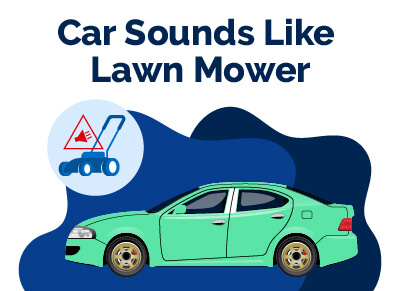Why Does My Car Sounds Like a Lawn Mower? Top 6 Reasons (and How To Fix It)
February 15, 2024


Chris is Head of Content for FindTheBestCarPrice and is based out of Philadelphia, PA. As a seasoned automotive industry analyst and car enthusiast, he ensures the highest level of quality across all our content and curates our picks for the best deals each month.
Chris studied information systems and marketing at Drexel University and writes about a wide range of topics ranging from car buying tips to troubleshooting common mechanical issues.
When he’s not thinking about cars, he likes to stay in with his dog and make an “attempt” to finish a crossword puzzle (he’s not quite at the Saturday/Sunday level…yet). As a former cheesemonger, Chris still has a “sharp” passion for all things cheese, and his fridge is always loaded with it!
Chris also has a passion for things that go fast, and drones are no exception. He spends some of his time writing for Dronesourced.
If you've noticed that your car sounds like a lawn mower, it can be a cause for concern.
The sound can be caused by several factors including:
- Old Differential Fluid
- Engine Misfire
- Bad Wheel Bearing
- A Blown Head Gasket
- Exhaust Leak
- Old Tires
Sadly, it can be hard to diagnose the problem yourself if you’re not an auto mechanic, but there are some steps you can take to troubleshoot the issue on your own.
Let’s explore the common causes of a car sounding like a lawn mower, and some practical tips on the steps you can take to fix the issue.
Key Takeaways
Here are the top 6 reasons why your car may sound like a lawn mower and what to do about it:
- Old Differential Fluid- Change the fluid.
- Engine Misfire-Consult a technician for engine assessment and repair.
- Bad Wheel Bearing-Inspect each wheel and replace the bad bearing.
- Blown Head Gasket- Properly maintain engine coolant.
- Exhaust Leak-Repair or replace as needed.
- Old Tires- Regularly check tire pressure, and replace tires as needed.
Table of Contents
Why My Car Sounds Like a Lawn Mower and How To Fix It
The following are the leading causes of your car sounding like a lawn mower:
1. Old Differential Fluid
Outdated differential fluid could be the culprit behind your car's lawnmower-like noise.
This fluid helps reduce gearbox friction. However, if it's old, cracked, or leaking, it can cause problems.
Deteriorating differential oil can cause:
- overheating
- gear lockup
- gear damage
- broken gears
- stopping your car
How To Fix It
If you suspect that the gears are causing the noise, it's best to seek professional help immediately.
Waiting too long to address the issue can further damage your vehicle.
How to Prevent It
To prevent such problems, change the differential oil every 30,000 to 50,000 miles. This ensures optimal performance and minimizes the risk of a lawnmower-like noise from your car's gears.
2. Engine Misfire
An engine misfire transpires when one or more cylinders fail to engender propulsive force. Possible causes include an obstructed spark plug, malfunctioning oxygen sensor, or obstructed fuel injector.
In addition, unburned fuel can ignite in the following cylinder, resulting in a sound similar to that of a lawnmower.
Driving with a misfiring cylinder can be hazardous. It may cause your vehicle to stall while driving, posing serious risk and potentially leading to accidents.
How To Fix It
Accurately diagnosing the engine misfire is vital.
Listen to the acoustic emissions of your vehicle. If it exhibits irregular or uneven operation, it may be because of an engine misfire.
As misfires can have multiple causes, it's best to consult a qualified technician to diagnose the problem accurately rather than guessing which parts need to be replaced.
Professional expertise can help you address the root cause of the misfire and resolve the issue effectively.
3. Bad Wheel Bearing
Wheel bearings are affixed atop a metallic tube to mitigate friction during vehicular motion.
However, these bearings are susceptible to rust and corrosion if not adequately lubricated regularly, potentially leading to a lawnmower-like noise.
Symptoms of a malfunctioning wheel bearing include:
- pronounced noise as the wheel rotates
- excessive play when the wheel is rocked
- uneven tire wear
- a wobbly steering wheel
- vehicle drifts or pulls while driving
A failing wheel bearing can result in lateral movement, causing tire noise and impeding axle mobility. It can also cause the wheel to lockup while driving.
How To Fix It
Inspect each wheel individually for potential issues.
Safely raise the vehicle one tire at a time and slowly rotate the wheel to detect any metallic, crackling, or squeaking sounds.
Alternatively, you can roll each wheel separately to assess for failing wheel bearings. If the wheels exhibit such noises, it indicates a broken wheel bearing. This requires immediate replacement to ensure safe driving.
4. A Blown Head Gasket
The head gasket is a critical component within your engine, tasked with sealing off the cylinders and preventing any coolant or engine oil from leaking.
Considering the extreme operating conditions of an automobile engine, overheating can pose a significant risk of head gasket failure.
A blown head gasket can manifest as a lawnmower-like noise and may even threaten your hearing, as it can release hazardous gases into your vehicle's interior.
Furthermore, a ruptured head gasket can adversely impact your vehicle's performance. It may reduce speed, cause potential engine failure, and lead to costly repairs.
How To Fix It
Seek the expertise of a skilled mechanic right away.
They will use new gaskets that meet or surpass the original manufacturer's specifications.
How to Prevent It
To prevent head gasket failure in your vehicle, diligently maintain the engine coolant at the appropriate level. Mix it according to the manufacturer's recommendations.
This proactive approach can help mitigate the risk of head gasket issues and safeguard the performance and longevity of your engine.
5. Exhaust Leak
As the exhaust system transports highly heated chemicals, the components undergo expansion and contraction, facing considerable strain.
An exhaust leak can manifest as a noise reminiscent of a lawnmower when the vehicle is started or accelerated. Therefore, it's relatively easy to detect with a visual inspection of the exhaust system.
However, the consequences of an exhaust leak extend beyond just the noise. It can release harmful gases into the atmosphere, compromising the cabin air quality and potentially causing failed emissions tests.
Many harmful gases, including the insidious odorless carbon monoxide, can secretly permeate the passenger compartment, causing grave health hazards.
How To Fix It?
To address this issue, run your vehicle and carefully place your palm near the exhaust pipe without making contact. Determine if the telltale noise is from an exhaust leak.
Subsequently, seek the assistance of qualified professionals. Many exhaust system issues are caused by metal corrosion, requiring specialized welding repairs.
In some instances, replacing bolt-on components or exhaust system repairs may be enough, but this is relatively rare.
Prompt action is crucial to mitigate the risks of an exhaust leak and ensure safe car use.
6. Tire Issues
Fresh tires offer a smooth and noiseless ride in your vehicle. Conversely, tires that have worn out over time can emit loud, clunky noises.
Underinflated tires can also produce a similar din. Should your automobile start resembling a lawnmower, pull over and thoroughly examine the condition of your tires.
Driving on worn-out or underinflated tires poses various risks, including:
- diminished road grip
- tire blowouts
- squeaking brake pedals
- even potential accidents.
Notably, poorly worn-out tires significantly elevate the hazards of driving. Even in dry weather conditions, they fail to establish a firm grip on the road. They impede proper steering and potentially cause the vehicle to skid while braking.
As such, it is imperative to inflate tires to the correct pressure levels and replace them on time.
How To Prevent It
Regularly check your tire pressure at least once a month, particularly before embarking on long trips or carrying heavy loads.
Check the sticker on the driver's door or door jamb for the prescribed tire pressure specifications from the vehicle manufacturer. You can also spot them in your owner's manual.
How to Fix It
Fill tires to their proper pressure levels at all times. If they fail to stay inflated correctly or are past their recommended lifespan, then replace them.
Conclusion
if your ride's humming a tune more suited to the backyard than the open road, it's high time to tune in.
From old differential fluid to the misadventures of engine misfires (not to mention those wheel-bearing woes or blown head gaskets), your car's symphony of sounds is a call to action.
Regular check-ups and timely fixes are your best bet to keep the good times rolling.
Caught a hint of something off? Swing by your trusty mechanic for a pit stop.
For more car maintenance advice, head to https://www.findthebestcarprice.com/.
Best Car Deals by Category
Frequently Asked Questions
Why does my car make a weird sound when speeding up?
If accelerating makes your car sound like a lawn mower, the most likely reason is an exhaust leak.
Why does my car make a sound like a lawn mower?
It could be due to deteriorated tires, insufficiently inflated tires, or leaks in the exhaust system. These conditions can induce friction, generate noise, and manifest as a sound resembling that of a lawn mower.
Is it safe to drive my car if it sounds like a lawnmower?
No, you should not continue driving your car if it emits a sound resembling a lawn mower. Potentially underlying causes, like engine leaks, pose safety risks. Pull over, inspect the vehicle, and promptly address the cause of the noise to ensure safe driving.
How can I fix my car if it sounds like a lawnmower?
First, identify the root cause of the sound, which could be worn-out tires, underinflated tires, or exhaust leaks. Depending on the cause, you may need to replace tires, inflate tires to the correct pressure, or repair the exhaust system. Consult with a skilled mechanic and ensure the right solution.
Why is my car making a chugging or banging noise?
Failing spark plugs often cause your car to make a banging or chugging noise. If spark plugs are the reason, you may also experience mileage loss, reduced fuel efficiency, or rough idling.
Posted in Car Buying Tips, Car Troubleshooting |




